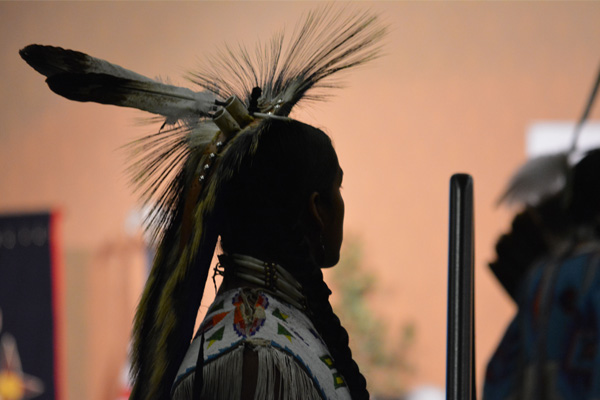
- Details
- By Neely Bardwell
Tribes are still pushing back on the Trump administration’s push to reduce federal funding on initiatives for Diversity, Equity, Inclusion, and Accessibility (DEIA), with tribes taking a strong position that they are separate from DEIA initiatives, and their federal assistance is instead rooted in government-to-government relationships enshrined in treaties and trust responsibilities.
Just three days after President Donald Trump’s second inauguration, OJ Semans (Rosebud Sioux Tribe), executive director of the Coalition of Large Tribes (COLT), began receiving phone calls, reporting that tribes were struggling to access critical federal funds for tribal programs.
The following Monday, the White House Office of Budget and Management issued a directive instructing all federal agencies to temporarily halt their grant, loan, and financial assistance programs. This move threatened to disrupt billions of dollars in federal funding designated for tribal nations, impacting economic development, housing, infrastructure, and other essential initiatives.
Although the Office of Management and Budget later rescinded the directive—and two federal district judges blocked its implementation—some tribes continue to feel the effects of the abrupt administrative transition, compounded by numerous executive orders and directives.
In response, the Coalition of Large Tribes (COLT), which represents 20 tribal nations with large land bases, passed a resolution at the end of January advocating for tribal exemption from any federal funding freeze or reevaluation of services. Shortly after, Senator Lisa Murkowski, chair of the U.S. Senate Committee on Indian Affairs, sent a letter to the Office of Management and Budget that closely echoed COLT’s resolution.
COLT, dedicated to advancing legislative, regulatory, and policy reforms affecting large land-base tribes and their citizens, emphasized the significance of historic treaties between tribal nations and the U.S. government. These treaties established the United States’ responsibility to protect Indian Tribes, uphold their right to self-governance, ensure their safety and economic development, and honor its trust obligations—reinforcing the role of Indian reservations and lands as permanent tribal homelands.
“Our Treaties are binding contracts in perpetuity entered into in exchange for the lands that make our United States of America great,” the resolution states. “COLT believes it is imperative we remind the U.S. Government that Treaties are the Law of the Land and that Treaties and Sovereignty are ‘cornerstones’ of the Budget process and Federal Indian policy to effectuate the nation-to-nation agreements between us.”
Semans explains that they have been working through multiple presidential administrations to educate non-Natives when it comes to treaties and Trust responsibilities.
“We're going to remind them that we were at war and that we signed treaties to save lives, not only theirs, but ours. And moving forward, we want this to be a nation to nation relationship,” Semans told Native News Online. “They [the federal government] have this obligation. They are carrying on the words of their forefathers.”
The resolution from COLT said issues with their services started before the OMB memorandum that froze federal assistance.
“Since January 23, 2025, Tribal governments and Tribal organizations that serve Tribal citizens have encountered escalating problems with Federal accounts suddenly and without explanation “zeroed out” and our access to Federal payment systems shut-off,” the resolution states. “These freezes were not limited in any way, and included everything—public safety funds, healthcare funds, waste management funds, child protective service funds, etc.”
The resolution explains that most Tribes apart from COLT are more than fifty percent funded by Federal dollars. This means their Tribal governments will have to shut down in days or weeks if the broad freeze persists, which would be devastating to their Tribal citizens.
The COLT resolution cites President Reagan’s January 24, 1983 Statement on Indian Policy where he recognized the unique political relationship between Indian tribes and the United States interact on a government-to-government basis.
“This administration believes that responsibilities and resources should be restored to the governments which are closest to the people served. This philosophy applies not only to State and local governments but also to federally recognized American Indian tribes,” Reagan said, making a distinction between tribes and states. “When European colonial powers began to explore and colonize this land, they entered into treaties with sovereign Indian nations. Our new nation continued to make treaties and to deal with Indian tribes on a government-to-government basis.”
Read COLT’s Resolution HERE.
Levi Rickert contributed to this article.
More Stories Like This
Native News Weekly (August 25, 2024): D.C. BriefsUS Presidents in Their Own Words Concerning American Indians
NDAA passes House; Lumbee Fairness Act Advances
NFL, Vikings to Host Native All-American Game, Youth Flag Clinic
Senate Committee on Indian Affairs Passes 12 Bills to Strengthen Tribal Communities
Help us defend tribal sovereignty.
At Native News Online, our mission is rooted in telling the stories that strengthen sovereignty and uplift Indigenous voices — not just at year’s end, but every single day.
Because of your generosity last year, we were able to keep our reporters on the ground in tribal communities, at national gatherings and in the halls of Congress — covering the issues that matter most to Indian Country: sovereignty, culture, education, health and economic opportunity.
That support sustained us through a tough year in 2025. Now, as we look to the year ahead, we need your help right now to ensure warrior journalism remains strong — reporting that defends tribal sovereignty, amplifies Native truth, and holds power accountable.
 The stakes couldn't be higher. Your support keeps Native voices heard, Native stories told and Native sovereignty defended.
The stakes couldn't be higher. Your support keeps Native voices heard, Native stories told and Native sovereignty defended.
Stand with Warrior Journalism today.
Levi Rickert (Potawatomi), Editor & Publisher


